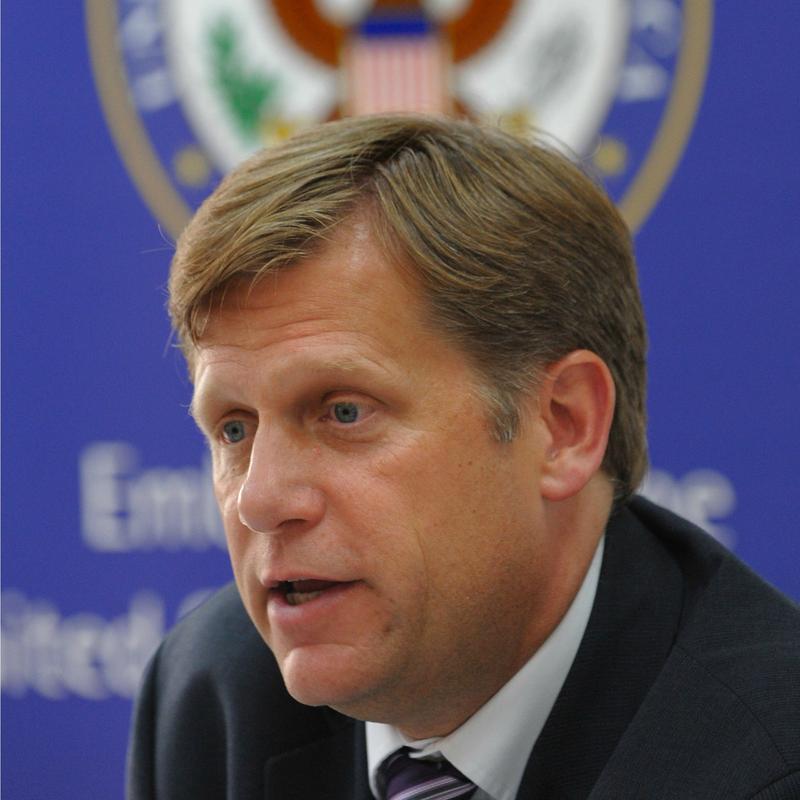BROOKE GLADSTONE: Michael McFaul has just returned to Stanford University after a couple of tumultuous years in Moscow as the U.S. ambassador to Russia. He said he often encountered the media trope that America, the enemy, was working within the Russian state. In fact, at times it got personal.
MICHAEL McFAUL: The main theme was the United States of America seeks to overthrow the government of Russia. They could say the State Department Gos Dep as we were called, is funding the opposition. And we said 200,000 times, we are not funding the opposition. So they put out a calendar called McFaul’s Girls.
[BROOKE LAUGHS]
And each January, February, March featured one of these opposition leaders that were McFaul's girls.
The Arab Spring, if you just watch Russian television, the gentleman who put himself on fire in Tunisia that was an American plot. All the way through the Arab Spring, the citizens of those countries had nothing to do with it. It was the United States, the CIA running covert operations to make that happen. And most certainly, inside Ukraine, this was all instigated by us.
BROOKE GLADSTONE: You are calling for the United States to answer Russian propaganda in a big and blatant way. What do you suggest?
MICHAEL McFAUL: Well, this view comes from my experience as ambassador for two years. We tried to do battle with it, through my Twitter account, on Facebook, through interviews for those outlets that could have me. I was banned from state media. And I engaged with my staff in debates with Russian citizens all over that giant country, and I thought it was great. But it felt like dropping pebbles [LAUGHS] in, in the ocean.
I think during earlier eras we took this more seriously. I do not believe in propaganda, but I do believe in, in telling accurate information and getting that information out there. And we’re just, as a government, not putting resources into it.
I saw the ratings for my country in Russia peak at about 62, 65 percent, I believe, in 2010 to now creeping in the teens. And our policy didn’t change. What changed was the editorial direction of those Russian state-controlled media outlets.
BROOKE GLADSTONE: Here’s a theme that’s been frequently struck in the American media. You hear it a lot from Republicans who are featured on the news.
[CLIPS]:
SEN. TED CRUZ: A critical reason for Putin’s aggression has been President Obama's weakness.
SARAH PALIN: People are looking at Putin as one who wrestles bears and drills for oil. They look at our president as one who wears mom jeans.
JOHN McCAIN: This is the ultimate result of a feckless foreign policy where nobody believes in America’s strength anymore.
[APPLAUSE] [END CLIPS]
MICHAEL McFAUL: Yeah, that’s completely ridiculous. [LAUGHS] [BROOKE LAUGHS]
Sorry, I can’t – I can’t think of a better phrase. I mean, you know, George W. Bush failed to prevent Russia from intervening in Georgia. Ronald Reagan, he failed to prevent the martial law orchestrated in Poland by General Jaruzelski and Leonid Brezhnev. General President Eisenhower, 1956, his policy was called rollback of Communism. He had some very tough language and when tanks rolled into Budapest in 1956, that tough language totally disappeared. They were unable to deter Russian aggression.
Democrat, Republican, strong, weak – oh, I, I left Johnson, of course, Czechoslovakia, in 1968. I don’t see a particular pattern here that suggests, you know, one kind of president provokes Russian aggression more than the other.
BROOKE GLADSTONE: But you don't discount the importance of personality.
MICHAEL McFAUL: No, I actually, now having been in government for five years, believe this even more strongly, that individuals do matter and, in this case, there's no doubt in my mind. This is Putin's war.
BROOKE GLADSTONE: You said he was angry when he got back into power, after he switched jobs with his handpicked president Dmitry Medvedev.
MICHAEL McFAUL: Well, Putin, in his first two terms, had a narrative, from his perspective and from many Russians’ perspectives. At the time he came to power, in his view, the state was collapsing, the economy had not recovered from the worst economic depression probably in Russia's history, and Russia was on its knees vis-à-vis the West. And in the first eight years that he was in power, he restored the state, he cracked down on the, the breakaway republic of Chechnya, as you’ll remember. The Russian economy grew on his watch. [LAUGHS] I personally think the economic growth had way more to do with oil prices, but it happened on his watch, he gets credit for it.
That was his narrative, right? And he left with that narrative when he handed over power to Medvedev.
When he came back, that narrative wasn't good enough for the most educated elites, rich people of Russia. It was like, what are you gonna do now? And that agitated him, in my view, just watching him as I was ambassador.
And then, second, there were massive demonstrations to protest the falsified December 2011 parliamentary elections, and that was scary for President Putin and his entourage. And so, that's when he decided to crack down on the demonstrators and civil society and, and the independent media, on the one hand, and then to create this new enemy from abroad, the United States of America, to roll out that bag of tricks, again.
BROOKE GLADSTONE: Thank you very much.
MICHAEL McFAUL: Thanks, Brooke.
BROOKE GLADSTONE: Michael McFaul served as US Ambassador to Russia from 2012 until just last month.

